
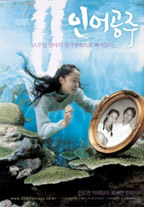
In-eo-gong-joo
South Korea 2004
Genre:
Romance, Drama, Fantasy
Director:
Park Heung-sik
Cast:
Jeon Do-yeon
Ko Doo-sim
Park Hae-il
Kim Bong-geun
Lee Seon-gyoon
Kim Eun-yeong

My Mother, the Mermaid
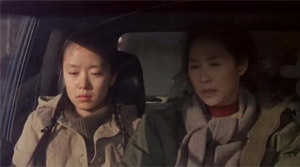
Story: Na-young (Jeon Do-yeon) has to cope with the fact that she can't go to college because of her father's debt. Her father is emotionally
distant while her mother, Yeon-soon (Ko Doo-shim), likes to make herself heard. However, suddenly Na-young's father disappears. He probable returned to the
village he was born at. Yeon-soon pretends that she doesn't care and advises her daughter to do the same. In fact, Na-young has the rare chance to make a
business trip to New Zealand, but she doesn't take her flight. Instead she sets out for her father's village. When she gets there she runs into a woman
who looks exactly like her. Na-young apparently seems to have traveled back in time and is now standing in front of her own mother. Yet, Yeon-soon is completely
different from what she is in her later years. She works as a diver in order to enable her brother to go to school. Yeon-soon herself never even learnt how to
read and write. Nevertheless, she repeatedly makes her brother send her letters so that she can see the postman (Park Hae-il). The postman also soon starts to
like Yeon-soon. Could he be Na-young's father?

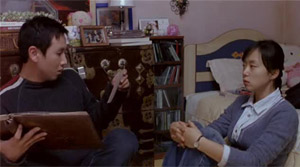
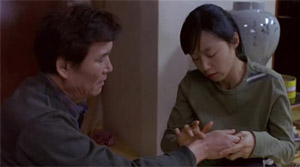

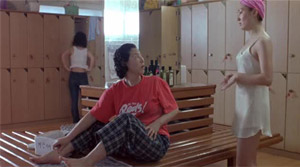
Review: It's always a pleasure looking back at Korean cinema the way it was a few years ago. At that time there were still movies that
managed to tell dramas without lots of special effects and forced tears - honest and heartwarming. "My Mother, the Mermaid" isn't perfect, but the plot
around a daughter and her mother, which in its core also comes along with a love story, convinces with minimalistic, but nice directing and a story that
actually touches you. Of course, lead actress Jeon Do-yeon is at her best once again as well and carries the film over the more heavy-handed moments with ease.
After all, the movie in fact tells two stories that are only connected clumsily and despite all the goodwill wanting to fill the empty spaces yourself it still
comes with its fair share of problems.
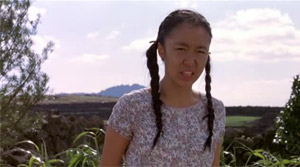
One of those problems is that the transition the mother undergoes isn't very compellingly motivated by the story. The individual we get to see in the 60s differs
so much from the one we are presented in the present that you have to ask yourself what actually happened in the years in between. There are naturally a few
hints, particularly a few lines towards the end which the mother directs at her husband, but as much as I'd like to say otherwise this isn't enough. Yet, it
needs to be pointed out that Jeon Do-yeon ("Way Back Home", "Secret Sunshine") does everything
in her power to somehow get a few of the later mother's character traits into the younger version as well. Kudos for that. In the present Ko Doo-shim has a
strong screen presence, too, and aptly makes the viewer dislike her.
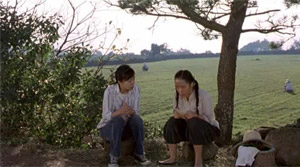
Actually, it's not that big of an issue that this romantic drama has a rather fantastic hook. What's bothersome, though, is that Na-young somehow seems to
end up in the past without any real crossing being visible. And just as suddenly as she gets there she returns to the present as well. Even more of a serious
matter is that from the moment on she meets her mother the story completely shifts to Yeon-soon. Na-young just sits around at her mother's home and doesn't seem
to have any interest in doing anything at all! She also doesn't seem to be in panic that she may never be able to return home either! It's almost as if somebody
put her on stand-by until the screenplay needs her again. Consequently, her character doesn't turn out to be that interesting, although Jeon is doing quite a
remarkable job to portray both individuals on screen at the same time.
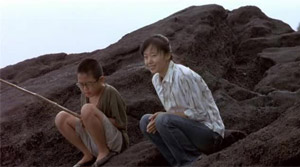
Accordingly, it isn't much of a surprise that it is Jeon's acting which makes us believe to have two completely different individuals in front of us so that
the camera tricks really aren't noticable at all. Park Hae-il ("Whistle Blower", "A Muse") delivers
a likable portrayal of the postman, too. The story around Yeon-soon is ultimately a nice and innocent love story that is brought to life by the idyllic
landscapes of the village and the sunny outdoor shots. Apart from that we also are introduced to the lives of the haenyo, the Korean female divers. Yeon-soon
may not be well-educated, but she has her heart in the right spot and belongs to the kind of people who had to make a living through hard physical labor in order
for today's generation to be able to study and dream of making the big bucks.

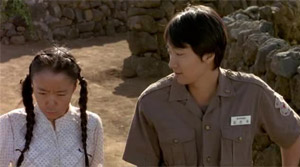
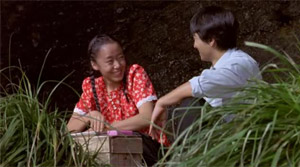

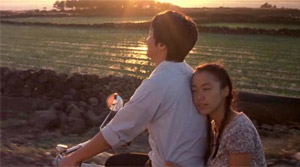
Director Park Heung-sik approaches things with a pleasantly subtle direction and succeeds in making the drama have an impact on the audience without having to revert to a tear-filled finale. Something which he obviously wasn't capable anymore ten years later with "Memories of the Sword". Next to the love story the movie is also a drama about the relationship between mother and daughter, though. Still, here "My Mother, the Mermaid" could have done better. Moreover, the relationship's credibility suffers from an inadequate bridge between frame story and the middle part. That being said it's not my intention to talk down the movie's cinematic magic. Park creates a film that warms your heart. That feeling of nostalgia when thinking back to the golden times of Korean cinema ten years ago isn't without reason.

Disclaimer










